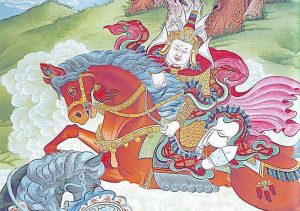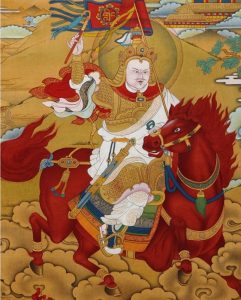 alt="Puer Surrounding Counties and Towns: Weekly & Special Local Markets Travel Guide"
/>
alt="Puer Surrounding Counties and Towns: Weekly & Special Local Markets Travel Guide"
/>
The Tibetan Oral Epic King Gesar
King Gesar(格萨尔王) is an oral epic of Tibetan Ethnic Minority, which is about Tibetan people’s legend, cultural and so on. It is one of the Intangible Cultural Heritage in Yunnan.

Brief Indroduction
Tibetan epic Gesar is also called King Gesar, Legend of Gesar and so on. It is a well-known and popular heroic epic in Tibetan areas of Yunnan, Sichuan, Tibet, Gansu and Qinghai provinces. Its lines had been recognized as 300,000 to 1.5 million lines, and it is known as the longest epic in the world. In Yunnan, it is mainly spread in Diqing Tibetan Autonomous Prefecture(迪庆藏族自治州), Lijiang (丽江) and other places.
Content
King Gesar mainly describes the war, such as The Four Battles of Four Direction(四方四大战役). King Gesar also tells the great events in King Gesar’s life, such as Gesar’s life in heaven and his reincarnation in the lower world, his marriage, how he became the king through horse racing , how he defeated the demons of the north and so on.

King Gesar
King Gesar is a typical figure in Tibetan folk literature. People use romanticism to eulogize the ancient hero through various magical stories. From all kinds of stories about him. We can see that Gesar’s ideal was the ideal of the Tibetan people, and his behavior was the wish of the Tibetan people at that time. All the works mainly embodied the spirit of patriotism, against oppression and religious oppression. Most events that narrated in the stories are directly related to Tibetan people’s lives, which is the ultimate reason why the epic is so popular among the Tibetan people.
Tibetan Folk Song
In addition to a large number of copies and a small number of engraved copies of Gesar circulating in Yunnan, there are some Tibetan folk artists known for oral Gesar, they were called Zhongken (中肯), which means artists who specialize in singing Gesar. During singing, different characters have different tones, and each character sings differently on different occasions. The whole epic is sung in 40 to 50 different tones.
Chinese Version: http://www.ynich.cn/view-ml-11110-1228.html
Translated by Emily-Wang/王海玲

 7 Days GolfingTour
7 Days GolfingTour
 8 Days Group Tour
8 Days Group Tour
 8 Days Yunnan Tour
8 Days Yunnan Tour
 7 Days Shangri La Hiking
7 Days Shangri La Hiking
 11 Days Yunnan Tour
11 Days Yunnan Tour
 6 Days Yuanyang Terraces
6 Days Yuanyang Terraces
 11 Days Yunnan Tour
11 Days Yunnan Tour
 8 Days South Yunnan
8 Days South Yunnan
 7 Days Tea Tour
7 Days Tea Tour
 8 Days Muslim Tour
8 Days Muslim Tour
 12 Days Self-Driving
12 Days Self-Driving
 4 Days Haba Climbing
4 Days Haba Climbing
 Tiger Leaping Gorge
Tiger Leaping Gorge
 Stone Forest
Stone Forest
 Yunnan-Tibet
Yunnan-Tibet
 Hani Rice Terraces
Hani Rice Terraces
 Kunming
Kunming
 Lijiang
Lijiang
 Shangri-la
Shangri-la
 Dali
Dali
 XishuangBanna
XishuangBanna
 Honghe
Honghe
 Kunming
Kunming
 Lijiang
Lijiang
 Shangri-la
Shangri-la
 Yuanyang Rice Terraces
Yuanyang Rice Terraces
 Nujiang
Nujiang
 XishuangBanna
XishuangBanna
 Spring City Golf
Spring City Golf
 Snow Mountain Golf
Snow Mountain Golf
 Stone Mountain Golf
Stone Mountain Golf











 What Our Customers Say?
What Our Customers Say?
